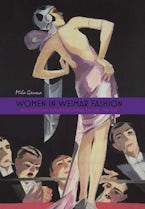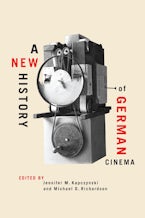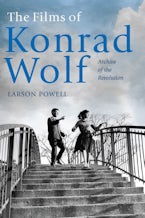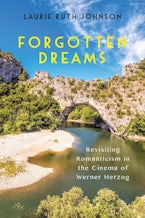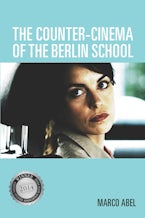
Title Details
266 Pages
22.8 x 15.2 cm
29 b/w illus.
Series: Screen Cultures: German Film and the Visual
Series Vol. Number:
18
Imprint: Camden House
Film and Fashion amidst the Ruins of Berlin
From Nazism to the Cold War
- Description
- Contents
- Author
- Reviews
Shows how cinematic treatments of fashion during times of crisis offer subtle reflections on the everyday lives, desires, careers, and self-perceptions of postwar German women.
This book steers attention toward two key aspects of German culture - film and fashion - that shared similar trajectories and multiple connections, looking at them not only in the immediate postwar years but as far back as 1939. They formed spectacular sites of the postwar recovery processes in both East and West Germany. Viewed against the background of the abundant fashion discourses in the Berlin-based press, the films discussed include classics such asThe Murderers Are among Us, Street Acquaintance, and Destinies of Women as well as neglected works such as And the Heavens above Us, Martina, Modell Bianka, and Ingrid. These films' treatments of fashion during times of crisis offer subtle reflections on the everyday lives, desires, careers, and self-perceptions of the women who made up a large majority of the postwar public. Costume - in films produced both by DEFA and by West German studios - is a productive site to explore the intersections between realism and escapism. With its focus on costumes within the context of the films' production, distribution, and reception, this bookopens up wider discussions about the role of the costume designer, the ways film costumes can be read as intertexts, and the impact on audiences' behaviors and looks. The book reveals multiple connections between film and fashion,both across the temporal dividing line of 1945 and the Cold War split between East and West.
Mila Ganeva is Professor of German at Miami University, Oxford, Ohio.
This book steers attention toward two key aspects of German culture - film and fashion - that shared similar trajectories and multiple connections, looking at them not only in the immediate postwar years but as far back as 1939. They formed spectacular sites of the postwar recovery processes in both East and West Germany. Viewed against the background of the abundant fashion discourses in the Berlin-based press, the films discussed include classics such asThe Murderers Are among Us, Street Acquaintance, and Destinies of Women as well as neglected works such as And the Heavens above Us, Martina, Modell Bianka, and Ingrid. These films' treatments of fashion during times of crisis offer subtle reflections on the everyday lives, desires, careers, and self-perceptions of the women who made up a large majority of the postwar public. Costume - in films produced both by DEFA and by West German studios - is a productive site to explore the intersections between realism and escapism. With its focus on costumes within the context of the films' production, distribution, and reception, this bookopens up wider discussions about the role of the costume designer, the ways film costumes can be read as intertexts, and the impact on audiences' behaviors and looks. The book reveals multiple connections between film and fashion,both across the temporal dividing line of 1945 and the Cold War split between East and West.
Mila Ganeva is Professor of German at Miami University, Oxford, Ohio.
Introduction
Vicarious Consumption: Wartime Fashion in Film and the Press, 1939-44
"Fashions for Fräuleins": The Rebirth of the Fashion Industry and Media in Berlin after 1945
Vignette 1 - Charlotte Glückstein: Historical Ruptures and Continuities in Postwar Fashion
Fashion amidst the Ruins: Revisiting Two Early Rubble Films, . . . und über uns der Himmel (1947) and Die Mörder sind unter uns (1946)
Vignette 2 - Hildegard Knef: Star Appeal from Fashion to Film
Farewell to the Rubble and Welcome to the New Look: Straßenbekanntschaft (1948) and Martina (1949)
Consuming Fashion on the Screens of the Early 1950s: Modell Bianka (1951), Frauenschicksale (1952), and Ingrid: Die Geschichte eines Fotomodells (1955)
Epilogue
Appendix 1:Principal Costume and Fashion Designers: Biographical Notes
Appendix 2: Films and Newsreels Discussed
Notes
Bibliography
Index
Vicarious Consumption: Wartime Fashion in Film and the Press, 1939-44
"Fashions for Fräuleins": The Rebirth of the Fashion Industry and Media in Berlin after 1945
Vignette 1 - Charlotte Glückstein: Historical Ruptures and Continuities in Postwar Fashion
Fashion amidst the Ruins: Revisiting Two Early Rubble Films, . . . und über uns der Himmel (1947) and Die Mörder sind unter uns (1946)
Vignette 2 - Hildegard Knef: Star Appeal from Fashion to Film
Farewell to the Rubble and Welcome to the New Look: Straßenbekanntschaft (1948) and Martina (1949)
Consuming Fashion on the Screens of the Early 1950s: Modell Bianka (1951), Frauenschicksale (1952), and Ingrid: Die Geschichte eines Fotomodells (1955)
Epilogue
Appendix 1:Principal Costume and Fashion Designers: Biographical Notes
Appendix 2: Films and Newsreels Discussed
Notes
Bibliography
Index
"[A] captivating interpretation of fashion and film in 'the long 1940s' in Germany . . . . a valuable resource for scholars and students, as well as a lively and fascinating read for a broader audience." Victoria Vygodskaia-Rust, GERMAN STUDIES REVIEW
"Meticulously researched...Ganeva's trenchant analysis shows how fashion maintained pretences of normality during wartime, bolstered the processes of postwar normalization, and eventually helped to define attitudes towards consumer culture and material abundance in a 1950s Germany divided between East and West." Marketa Uhlirova, SCREEN
"With [this book] Mila Ganeva puts forth an insight-rich study of the cultural meaning of fashion in film and the press from the Nazi period to the beginnings of the Cold War in Berlin. . . . [C]learly written and precisely researched . . . . An important contribution to research on the female horizon of experience in the 1940s and 1950s." Jan Uelzmann, FILMBLATT
"This interesting book sheds light on the [postwar] period [in Germany] by documenting that both [the film and fashion] industries cultivated a vision of the autonomous, professionally accomplished woman and that numerous women were able to achieve an independent existence within these industries." R. Bledsoe, CHOICE
"The book . . . is outstandingly researched and fills a thematic gap in the literature of German film history." Hans Helmut Prinzler, WWW.HHPRINZLER.DE
Hardcover
9781571135766
August 2018
£97.00 / $115.00
Ebook (EPDF)
9781787442955
August 2018
$23.95 / £18.99
Paperback
9781640141575
March 2023
£24.99 / $29.95
Title Details
266 Pages
2.28 x 1.52 cm
29 b/w illus.
Series: Screen Cultures: German Film and the Visual
Series Vol. Number:
18
Imprint: Camden House


